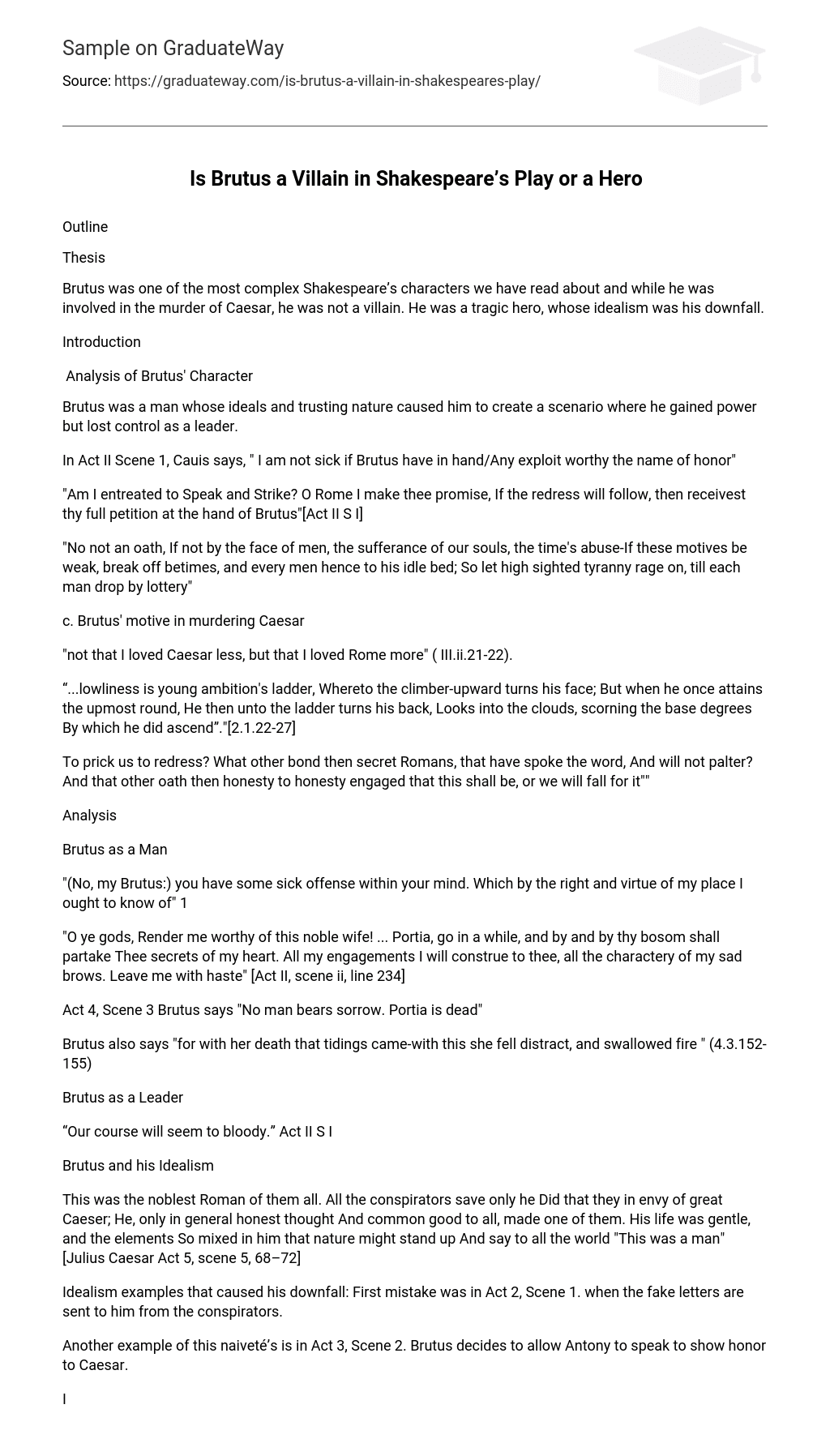Outline
Thesis
Brutus was one of the most complex Shakespeare’s characters we have read about and while he was involved in the murder of Caesar, he was not a villain. He was a tragic hero, whose idealism was his downfall.
Introduction
Analysis of Brutus’ Character
Brutus was a man whose ideals and trusting nature caused him to create a scenario where he gained power but lost control as a leader.
In Act II Scene 1, Cauis says, ” I am not sick if Brutus have in hand/Any exploit worthy the name of honor”
“Am I entreated to Speak and Strike? O Rome I make thee promise, If the redress will follow, then receivest thy full petition at the hand of Brutus”[Act II S I]
“No not an oath, If not by the face of men, the sufferance of our souls, the time’s abuse-If these motives be weak, break off betimes, and every men hence to his idle bed; So let high sighted tyranny rage on, till each man drop by lottery”
c. Brutus’ motive in murdering Caesar
“not that I loved Caesar less, but that I loved Rome more” ( III.ii.21-22).
“…lowliness is young ambition’s ladder, Whereto the climber-upward turns his face; But when he once attains the upmost round, He then unto the ladder turns his back, Looks into the clouds, scorning the base degrees By which he did ascend”.”[2.1.22-27]
To prick us to redress? What other bond then secret Romans, that have spoke the word, And will not palter? And that other oath then honesty to honesty engaged that this shall be, or we will fall for it””
Analysis
Brutus as a Man
“(No, my Brutus:) you have some sick offense within your mind. Which by the right and virtue of my place I ought to know of” 1
“O ye gods, Render me worthy of this noble wife! … Portia, go in a while, and by and by thy bosom shall partake Thee secrets of my heart. All my engagements I will construe to thee, all the charactery of my sad brows. Leave me with haste” [Act II, scene ii, line 234]
Act 4, Scene 3 Brutus says “No man bears sorrow. Portia is dead”
Brutus also says “for with her death that tidings came-with this she fell distract, and swallowed fire ” (4.3.152-155)
Brutus as a Leader
“Our course will seem to bloody.” Act II S I
Brutus and his Idealism
This was the noblest Roman of them all. All the conspirators save only he Did that they in envy of great Caeser; He, only in general honest thought And common good to all, made one of them. His life was gentle, and the elements So mixed in him that nature might stand up And say to all the world “This was a man” [Julius Caesar Act 5, scene 5, 68–72]
Idealism examples that caused his downfall: First mistake was in Act 2, Scene 1. when the fake letters are sent to him from the conspirators.
Another example of this naiveté’s is in Act 3, Scene 2. Brutus decides to allow Antony to speak to show honor to Caesar.
In Act 5, Scene 2. He starts the battle without telling Cassius about it.
Brutus as a tragic hero
A tragic hero is one that has a fatal flaw and if we study Brutus’ character we see his fatal flaw being the idealism and naiveté that causes him to depend and trust on others. He has great ideas for Rome and he believes everyone else dreams for the progress of Rome rather than controlling the state.
Conclusion
This was the noblest Roman of them all. All the conspirators save only he Did that they in envy of great Caeser; He, only in general honest thought And common good to all, made one of them. His life was gentle, and the elements So mixed in him that nature might stand up And say to all the world “This was a man” [Julius Caesar Act 5, scene 5, 68–72]
References
- Julius Caesar Shakespeare
- Burckhardt, Sigurd. “How Not To Murder Caesar.” 1968. http://www.clicknotes.com/JC_Navigator/Burckhardt.html





